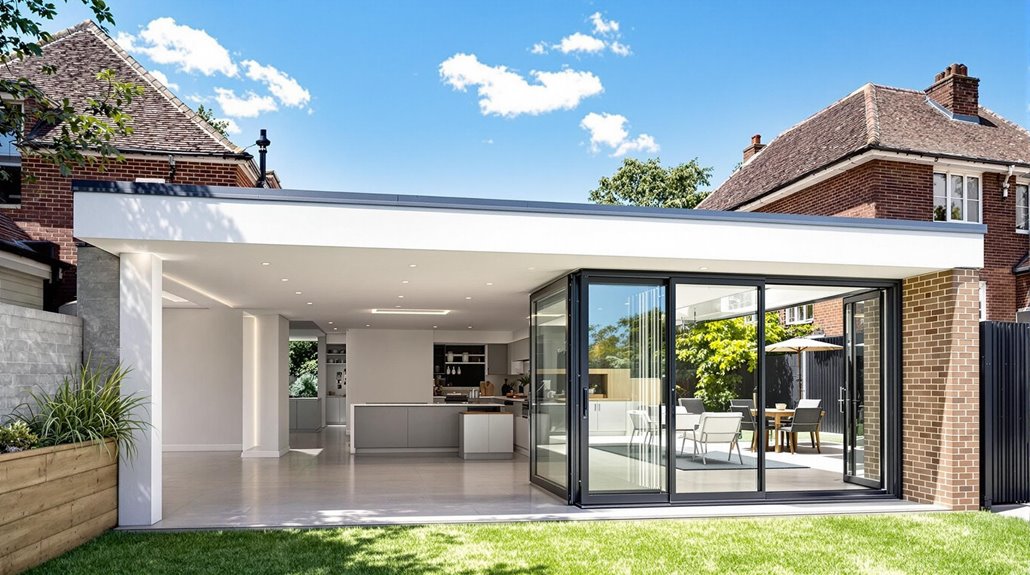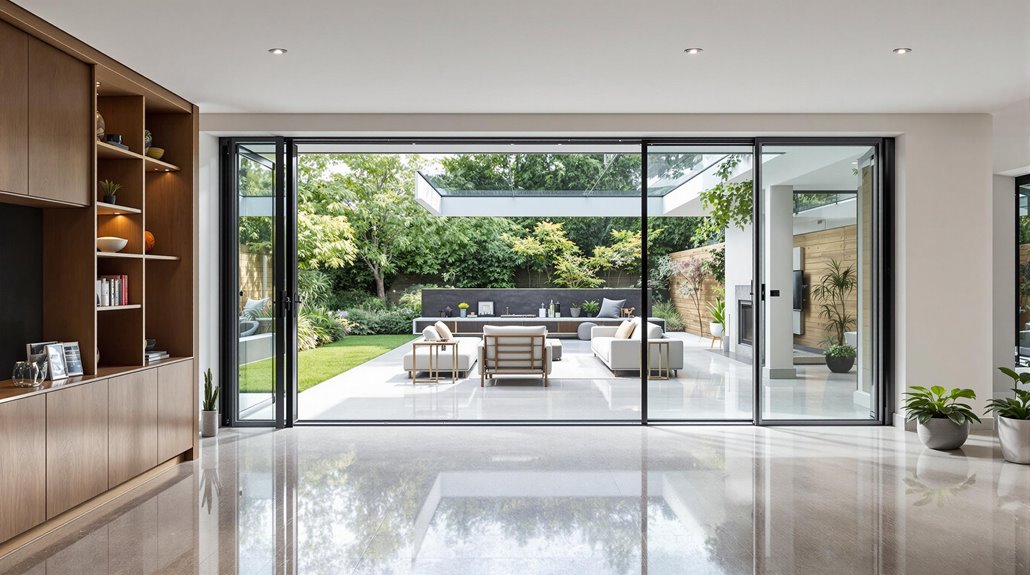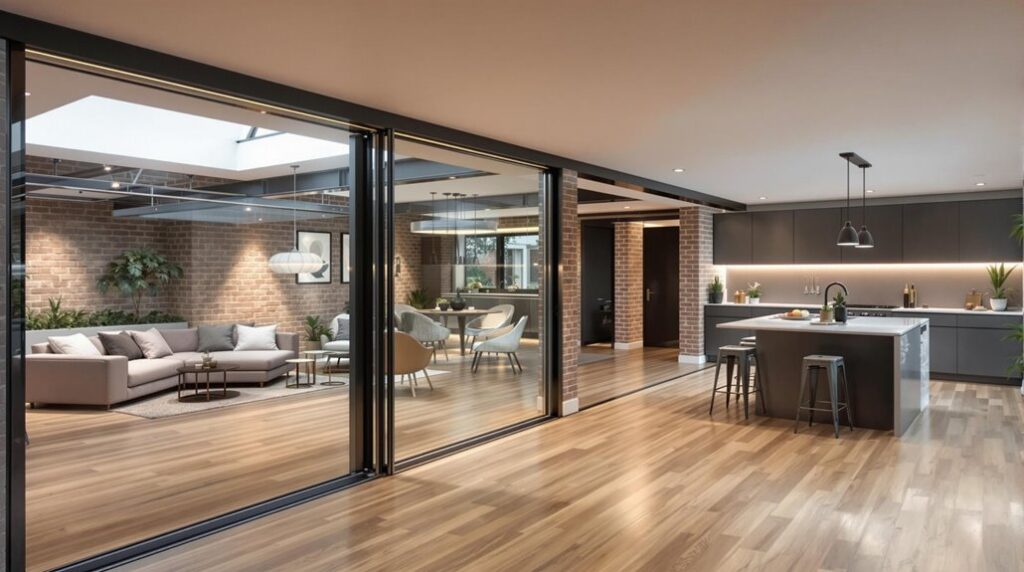I’ve helped dozens of homeowners transform their unused basement spaces into valuable assets, and I can tell you that the right approach makes all the difference between a costly mistake and a brilliant investment. While basement extensions aren’t cheap—you’re looking at £2,000-£3,000 per square meter—the potential 54% value boost means smart planning and execution are essential. Before you commit your budget, there’s one vital factor most homeowners overlook that could save you thousands.
Key Takeaways
- Basement extensions typically cost £2,000-£3,000 per square metre but can increase property values by 30-54%.
- Full-storey basement conversions can generate up to £291,699 net profit for UK homeowners.
- London and southeast regions see the highest returns, with some areas achieving 96% value increases.
- Flexible open-plan layouts with premium features like home cinemas and wine cellars maximize buyer appeal.
- Existing cellars cost less to convert than new excavations, with construction requiring minimum 18-week commitment.
Understanding Different Types of Basement Extensions and Their Costs
Before diving into your basement extension project, you’ll need to understand that costs vary greatly based on the type and scope of work you’re planning. If you’re working with an existing cellar, you’ll face lower costs since minimal structural work’s required. However, new excavation projects demand underpinning at roughly £2,800 per m² in London. Additionally, a well-planned extension can significantly increase property value and enhance your home’s livability.
I’ve categorized three main project scales: small-scale conversions under £100k focus on basic amenities without kitchens or bathrooms. Mid-scale projects (£100k–£130k) include partial amenities, while luxury extensions exceed £150k with high-end finishes, pools, or full kitchens. Remember that professional guidance is essential throughout your project to effectively manage unexpected costs that can arise during construction.
Your location greatly impacts pricing—London and southeast costs run 30–40% higher than national averages. Budget wisely by understanding these fundamental differences before committing.
Key Factors That Drive Up Your Basement Extension Budget
Understanding project scales gives you the foundation, but specific factors will make or break your budget. I’ve seen excavation costs jump from £1,500/m² under gardens to £3,000/m² under existing structures. You’ll face harder hits when clay soil demands mini-piling, adding 25-30% to your costs, or when you hit rock strata that doubles drilling expenses.
Structural work gets expensive fast. Underpinning foundations costs £1,500-£2,000/m², while achieving proper 2.4m ceiling height adds 20%+ to excavation work. Don’t forget waterproofing essentials – thorough tanking runs £60-£100/m², and sump systems add another £2,000-£5,000. Converting existing cellars typically costs £750-£1,400/m², making cellar conversion one of the most budget-friendly basement options available.
Ground conditions cause the biggest surprises. High water tables, contaminated soil, or hazardous materials can add £5,000-£20,000 to your project unexpectedly.
Comparing Basement Extensions to Other Home Extension Options

When you’re weighing basement extensions against other home expansion options, the numbers tell a clear story about value and functionality. While you’ll pay £2,000–£3,000 per square metre for basement work, you’re getting a 30% property value boost that outperforms most alternatives.
I’ve found basements integrate seamlessly with your existing living space, unlike isolated loft conversions or rear extensions that eat into your garden. Side return extensions offer moderate value increases at lower costs, but they can’t match a basement’s versatility for bedrooms, home offices, or entertainment spaces. The improved energy efficiency from reinforced foundations and lack of exposed walls also sets basement extensions apart from traditional above-ground options. Additionally, the cost factors such as excavation and construction play a significant role in determining the overall investment.
Your biggest consideration? Only 5% of UK homes have convertible basements, so you’ll likely need excavation. However, you’ll preserve your garden space while creating flexible areas that don’t face height restrictions or overlooking issues.
Premium Finishes and Features That Elevate Your Basement Space
Why settle for a basic basement when strategic premium finishes can transform your excavated space into your home’s crown jewel? I’ll show you cost-effective upgrades that deliver maximum impact.
Start with structural elements as design features. Expose those concrete soffits for industrial-chic appeal—it’s actually cheaper than covering them. Install travertine around wet areas like pools; it’s investment-grade material that handles moisture brilliantly.
Light makes everything premium. Position floor-to-ceiling windows in your extension and use white-painted walls as natural reflectors—simple physics working for your budget. Consider sun tunnels as an effective technique for channeling natural light into interior basement areas where traditional windows aren’t feasible.
Match your basement finishes to upstairs rooms for seamless flow. Replicate architectural details like cornices to create continuity. Add bespoke features: wine cellars, entertainment zones, stone-lined pools. These aren’t luxuries—they’re strategic investments that transform unused space into your home’s most coveted retreat.
Planning Permission and Regulatory Requirements You Need to Know
How often do ambitious basement projects crash into regulatory roadblocks that could’ve been avoided with proper planning? I’ve seen countless homeowners hit costly delays because they didn’t understand the permission requirements upfront.
Here’s what you need to know: if you’re excavating for a new basement, adding external features like lightwells, or creating a separate unit, you’ll need full planning permission. However, converting existing basement space typically falls under permitted development rights – a major cost-saver. It’s essential to remember that leaseholders have specific rights when it comes to alterations.
Don’t forget the essentials: Building Regulations approval is mandatory for every project, Party Wall Agreements protect you legally, and leasehold properties need freeholder consent first. Conservation areas and listed buildings have stricter rules.
My advice? Consult your local planning department early – it’ll save you thousands in potential redesign costs. Local authorities often have supplementary planning documents specifically for basement projects that outline size, depth, and construction requirements.
Financial Planning and Budgeting for Your Basement Project
Before you fall in love with ambitious basement designs, you’ll need to face the financial reality – basement extensions rank among the most expensive home improvements you can undertake.
Converting an existing cellar costs £750–£1,400 per square metre, while digging new basements ranges from £1,500–£3,000 per square metre. I’d budget £40,000–£50,000 for a small 20m² basement, scaling up to £120,000+ for larger projects. It’s important to note that regional price variations can significantly impact overall costs.
Here’s my practical budget breakdown: allocate 60-70% for construction, 10-15% for professional fees, and 15-20% contingency for inevitable surprises.
Smart cost-cutting strategies include converting existing cellars instead of excavating new ones, choosing standard finishes over premium, and excavating under gardens rather than houses. Effective project management can deliver substantial savings of 15-25% on both labor and materials costs. Always get multiple quotes – this isn’t the time for single estimates.
Maximizing Property Value Through Strategic Basement Design

While those budget figures might seem challenging, basement extensions deliver exceptional returns when you design them strategically. I’ve seen London homeowners gain £291,699 net profit on full-storey basements, with properties boosting values by 54% across the capital. You’ll maximize returns by focusing on high-value spaces like bedrooms, playrooms, and home cinemas that enhance daily living. Additionally, smart home extensions can further increase appeal and functionality, making your basement more attractive to potential buyers.
Target flexible, open-plan layouts that appeal to modern buyers. In prime areas like Kensington and Chelsea, I’ve witnessed 96% value increases, while Camden delivers 84% growth. Even smaller two-room additions generate £60,000 net gains on £90,000 investments. Remember that construction requires a minimum 18 weeks commitment, so plan your timeline accordingly when considering this valuable home improvement investment.
Conclusion
I’ve shown you the numbers—basement extensions can boost your property value by up to 54%. With costs averaging £2,000–£3,000 per square meter, you’re looking at substantial returns if you plan strategically. Focus on obtaining proper permits, budgeting for quality finishes, and designing spaces that appeal to modern buyers. Whether you’re creating a cinema room or playroom, smart basement planning transforms unused space into valuable square footage that pays dividends.
References
- https://www.checkatrade.com/blog/cost-guides/cost-build-basement/
- https://www.checkatrade.com/blog/cost-guides/house-extension-cost/
- https://www.homehow.co.uk/costs/basement-conversion
- https://designfor-me.com/project-types/extensions/how-much-does-a-basement-extension-cost/
- https://buildpartner.com/how-much-does-it-cost-to-build-an-extension-in-2025-a-uk-guide/
- https://dampsurveyorsltd.com/house-extension-cost-comparison/
- https://www.the-page.co.uk/blog/how-much-a-basement-conversion-costs-in-london/
- https://www.sold.co.uk/home-improvements/basement-extension/
- https://midrender.co.uk/how-much-do-house-extensions-cost-uk/
- https://urbanistarchitecture.co.uk/have-you-ever-thought-about-adding-a-basement-to-your-house/

